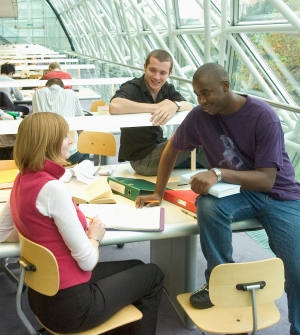Postgraduate research Finance overview Funding How to apply
 The Faculty of Law has a large cohort of over 100 postgraduate students undertaking advanced legal research, mostly on the three-year PhD programme. Our academic standards mean that entrance to the programme is highly competitive, and our research student community is composed of some of the most highly qualified lawyers from all over the world. Many of our students come straight through from the prior stages of their legal education, but many others come back to legal research having spent some years in legal practice or related professional work. This diversity of background and experience and the intellectual talent of our research student community make for a stimulating academic environment in which to be living and working. You can look at the research profiles of our current research students.
The Faculty of Law has a large cohort of over 100 postgraduate students undertaking advanced legal research, mostly on the three-year PhD programme. Our academic standards mean that entrance to the programme is highly competitive, and our research student community is composed of some of the most highly qualified lawyers from all over the world. Many of our students come straight through from the prior stages of their legal education, but many others come back to legal research having spent some years in legal practice or related professional work. This diversity of background and experience and the intellectual talent of our research student community make for a stimulating academic environment in which to be living and working. You can look at the research profiles of our current research students.
Legal research and publishing within the Faculty are largely carried out by individual members either as self-directed work or in collaboration with other scholars in Cambridge or elsewhere. However, the Faculty has several specific Centres for research and related activities in particular areas of law. While the Centres do not between them cover every imaginable area of legal research, most of our research students will have a natural affinity with at least one Centre. The Centres host regular seminars and other events involving both local and visiting speakers. Several of the Centres actively encourage current research students to present their work to these and other faculty seminar groups.
Research Degrees offered by the Faculty of Law
The Law Faculty offers two degrees awarded on the basis of either full-time or part-time supervised research:
- the three-year PhD
- the two-year MLitt
Supervision of Research Students
Cambridge offers excellent supervision for its legal research students from amongst its internationally renowned faculty members. The Faculty of Law has academic strength across the full range of legal disciplines, including international law, all aspects of private law and private international law, public law, EU law, corporate governance, intellectual property, tax law, family law, criminal law, labour law, legal history, jurisprudence and legal theory. It is important both for you, making your decision about whether to apply to Cambridge to do your research degree in Law, and for us, making our decisions about which students to admit, that your topic is one that we will be able to supervise. You can see the range of expertise available within the faculty by looking at the research profiles of our faculty members. It is sometimes possible for us to arrange co-supervision with an academic from another department where the topic of the proposed research has an inter-disciplinary aspect.
Please note that all decisions to admit students to our various research programmes, including the PhD, are made by the Degree Committee of the Faculty of Law, not by individual faculty members. Any other correspondence that you might have, for example with a potential supervisor, cannot be taken to constitute an offer of a place or an assurance of an offer in due course. There is no need for you to contact any individual faculty member about your application before submitting it; the Degree Committee consults prospective supervisors in relation to those applications which seem otherwise admissible as part of the application process. We advise Faculty members not to engage in lengthy correspondence with applicants. General queries regarding the admissions process should be directed to the Postgraduate Course Administrator at phdadmissions@law.cam.ac.uk.
The Degree Committee will not normally recommend the admission of a candidate who is already registered for an ongoing research degree at another university on a similar topic to that forming the basis of the proposal in the application to Cambridge which they intend to leave in order to take up a place at Cambridge. One case in which an exception might be made is for a candidate who is seeking to transfer to Cambridge with an existing supervisor who is taking up a post at the University of Cambridge.


 Facebook
Facebook  X/Twitter
X/Twitter  Instagram
Instagram  YouTube
YouTube  Flickr
Flickr  LinkedIn
LinkedIn